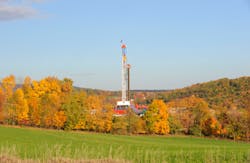The immense success of the shale gas industry in the United States has caused governments around the globe to look into possible development of natural gas fields in hopes that they could also find a way to energy independence.
However, many analysts believe that achieving similar results may be hard, if not impossible, for other countries because the shale gas boom in the United States could be attributed to a unique combination of favorable factors that other nations may not be able to replicate. This opinion was shared by a number of speakers at the CERAWeek energy conference earlier this month, the Star-Telegram reported.
There are plenty of factors that have facilitated rapid development of oil and gas production, attendees at the conference were told. These range from private land ownership to advanced drilling-equipment infrastructure, a number of existing pipelines and skilled workforces.
One speaker, James Baulderstone, a VP at Santos Ltd., a natural gas producer based in Adelaide, illustrated this by pointing out conditions in Australia. The country has big, ready-to-innovate energy companies and it has considerable shale deposits that could be shipped to local and international markets. However, the difference in existing infrastructure between Australia and the United States is striking. In Australia, there are not more than a dozen big pipelines and none of them crosses the continent from west to east. This lack of infrastructure is the key obstacle that prevents the development of the industry, Baulderstone stated.
But Australia is not the only country that fails to match U.S. achievements in shale gas and oil development, as well as in other unconventional resources. According to Pal Haremo, senior vice president of global new ventures for Norway's Statoil, the major difference is obvious — between 2008 and 2011, there were 35,000 unconventional wells drilled in the United States, compared to a mere 190 globally.
RELATED: Pipeline to connect Marcellus and Utica shale plays with US Gulf Coast
Still, a similar boom in gas and oil production is not unprecedented worldwide, said James Burkhard, vice president of oil market research at IHS — the company that sponsors CERAWeek. Apart from the United States, there are two countries that have increased their oil output by at least 900,000 barrels a day in just a year. The first one is Saudi Arabia, which managed to do so in 1974 following the OPEC oil embargo, and the second one is Iraq in 1991, after the end of the Gulf War.
At present, however, similar growth is far more difficult. China, which is among the most powerful nations and one of the fastest growing economies, is still light years behind the United States in terms of gas and oil development, despite the fact that it probably has more shale gas deposits. Xizhou Zhou, director of China energy for IHS, commented that the Asian country faces many more "above-ground risks," including the fact that the government owns the mineral rights, the lack of pipeline infrastructure and uncertainty about oil and gas prices and their affordability to the general public. Chinese shale development is still seven or eight years away, he estimated.The immense success of the shale gas industry in the United States has caused governments around the globe to look into possible development of natural gas fields in hopes that they could also find a way to energy independence.
